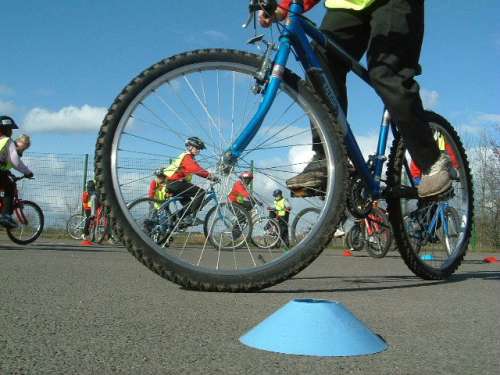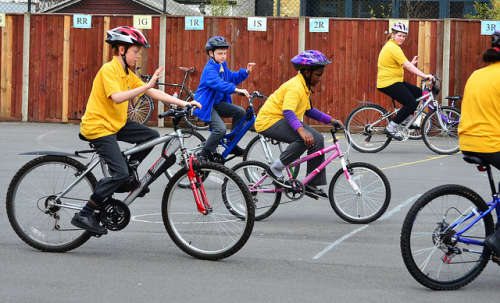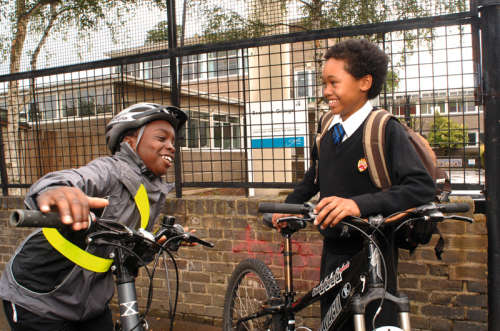This Autumn I’ve gone back to the future for working on teaching Bikeability levels 1 and 2.
http://www.dft.gov.uk/bikeability/
I say back to the future as this was what I did between 2005-2007 when finishing my degree in Adventure Recreation ( I was a mature student, had to get a 1st B.A or would have failed the mature student test of being the squarest in the group) and starting to work with young people for a career. Luton Borough Council were ahead of the game and were delivering Bikeability from the start 23 March 2007 being the date it was launched, a team of dedicated riders (who still work in cycling) drew up lots of schedules and ideas to make it an exciting course and Pauline Roby and the guys won awards for the work. As my C.T.U.K. 4 day instructor course took place in 2005 the 2 years practice teaching I had before becoming accredited in Luton Feb 2007 was a good bit of timing. Delivering again here in Dorset for freelance work then returns to what I feel is still one of the most ethical and important pieces of work I can do. Funny observations at the start here are the way that drivers still slow down and watch you working on the roads, smiling with a wistful, “ah cycle proficiency, how sweet”, look on their faces, actually guys it isn’t that sweet, the roads are busier than ever now U.Ks population density is the highest in Europe, and er, almost everyone owns a car.

With a cycle training gold rush in 2007 lots of new providers leapt in to try and seize what they saw as a lucrative business model, the profile of Bikeability went up, and there’s been some changes since, but within the regions many towns still use the Local Authority model to provide something of a service. What you need to know is that whilst Road Safety departments are in charge, they might have ridden a bike in the 1950’s England once, but many are still stuck in the Cycling Proficiency era. Look up I.T.O.S to discover the couple of currently progressive Councils, as almost all the 18 Instructor Training Organisations are independents.
The 3 weeks just gone have been working for Poole schools with a new colleague and we have now used up the whole D.f.T grant Poole Borough gained for the year, to provide free training for families that sign up. Both Poole and Bournemouth Councils have a list of accredited trainers who are employed on a zero-hours contract. Poole are recognised as Bikeability provider whilst Bournemouth failed the assessment criteria and continue to deliver a Council scheme. This weeks upcoming work is for Dorset County Council, who have another method of providing training by contracting out all training to several companies, one of which is run by a new super energetic career changer I’m working with. Next weeks work is for a school that have contracted us for a private booking, it’s the last week of Autumn Term 1, so likely the last time we can expect to work in the 3.30-5.30 slot. Schools can include this as part of their P.E provision, in the day, but until training becomes part of the national curriculum, it will been seen as an optional task for teachers to organise, and with teachers schedules as they are now I wont expect that to change in the very near future.
So we spend 2 hours on the playground on the first day checking the kids bike handling skills are sufficient enough to happily take them on the roads, then day 2-4 out on local streets. I’ve been risk assessing the areas for Poole work, which means finding streets in the vicinity of schools that offer the ideal locations for training, looking at junctions, road markings and places to teach the syllabus. This has to be done at the same time as training occurs, gauging the traffic levels and picking places with a fine balance between no traffic (worthless) and constant traffic (mental), as the whole point of Bikeability is teaching them how to interact with traffic and manage their risk in the sort of streets where they live. It’s about providing a quality teaching service which equips kids for independence and ability to explore their local areas by bike, essential life skills in my book. Level 3 stuff includes multi- lane roads and roundabouts which is a secondary and adult syllabus.

It’s a great syllabus designed to progressively skill the riders, and the Association of Bikeability Schemes (T.A.B.S.) have been pushing at governmental level for inclusion on the national curriculum for some time now. Actually since the 2007 gold rush died down and there are now organisations offering quality service, many of whom are Instructor Training Organisations, coupled with guarantees from transport minsters like Norman Baker that funding will continue the provision should be steadily growing over the next years. Good example is the nearby Hampshire firm who employ someone to co-ordinate the group composition, manage the school office paperwork and if needs be supply quality bikes for the trainees. Examples like this should also have no trouble satisfying the new quality assurance monitoring that T.A.B.S started this march 2013. As the Institute of Advanced Motoring (I.A.M.) embraces teaching sharing the road, and B.S.M. and AA include cyclist awareness modules, the work of upskilling everyday cyclists seems even more important now than when I started doing it 8 years ago http://www.bikehub.co.uk/news/sustainability/bsm-and-aa-driving-school-to-introduce-cycle-awareness-module/
news http://www.bikebiz.com/news/read/bikeability-trained-kids-cycle-more-finds-study/015493
So lots of courses, lots of work of the highest ethical value. With my Yoga teaching and this Mr Maslow would be proud of me, and if you know what that means without searching, you not only read all this post you’re probably a mature student like me too. Enjoy the ride.

